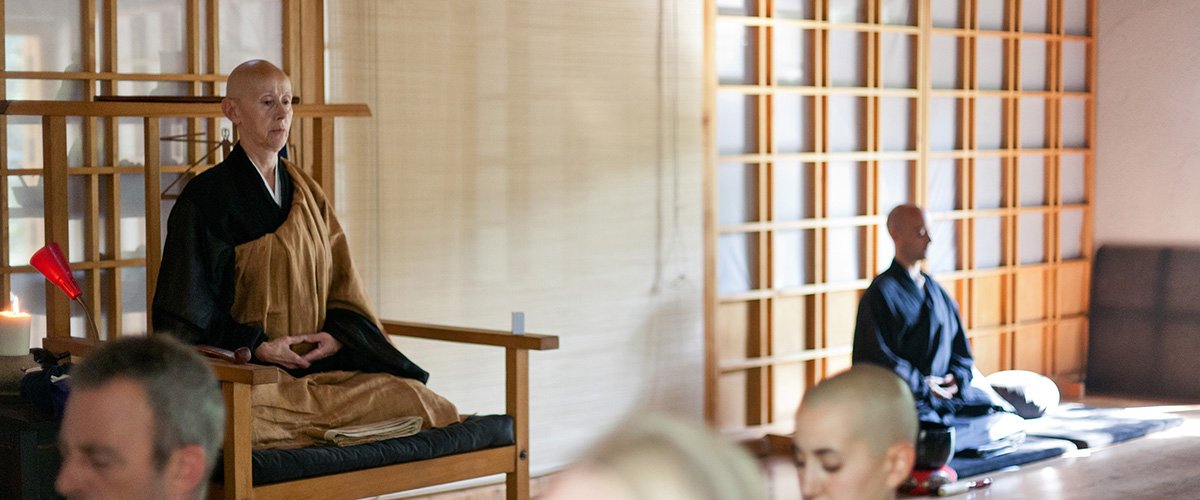Speech by Barbara Kosen
pronounced in front of the very great sôtô sangha
at the La Gendronnière temple in 2017
“Let us not enter into a system of grades and positions but let us manage things so that young monks, the future of our mission, show the spirit of the bodhisattva and turn toward the world without being influenced.”
Photo: Dojo of the Shorinji temple located 175km from Madrid (zenkan.com).
Master Taisen Deshimaru is the master who taught me the practice of the Way. I became his disciple and I received the nun ordination from him in the Paris dojo in 1975.1 practiced closely with him. After his death I spent three years in the Zurich Dojo, then 7 years in the Geneva Dojo. During these ten years I continued to practice in our Temple of La Gendronnière. In 1993 I received Dharma transmission from the hands of Master Kosen Thibaut right here in La Gendronnière. Master Kosen transmitted to us the Dharma following the rite of the same ceremony as the one he had received from Renpo Niwa Zenji. The following year I established a dojo in Madrid.
It is traditional, it seems, that the Zen master leaves a last poem before dying. For all his disciples Master Deshimaru wrote: Continue zazen eternally. Of course when I told this sentence to the new practitioners of the dojo of Madrid, there has been a smart spirit who told me: eternity does not exist. But he was ignoring that despite the remoteness of my original sangha, thanks to the merits of the transmission of the Dharma, I was accompanied by the ancient masters of the past who were pushing me to go forward and to protect the transmission. That is the eternity of practice, it never stops and finally, in eternity I am never alone.
In 2001 the Association Zen Taisen Deshimaru, founded in Madrid in 1996, bought a piece of land in the slopes of the Sierra de Gredos in order to establish there the practice of the Way. We founded the temple of Shorin-ji, Temple of the Forest of the Awakening.
This site rapidly became the place where we organized sesshins throughout the year and where 4 to 8 people live permanently. Zazen is the heart of it.
In the teaching that I received, Zen is zazen. Why did I not evolve towards a more institutionalised Zen, where the concentration on the ceremonies becomes the manifestation of the Zen spirit? For a good reason which is: from the first day when I sat down in zazen, the practice has been good for me. It allowed me to rebalance my life; to make me consciously alive. It permitted me to abandon the procession of natural discriminations that I was carrying inside myself. It directed me toward a deep knowledge of myself that naturally opened me towards other existences. That is what I wanted to transmit to all the ones who came to the Dojo. Why add anything else? Zen is very simple, this is the reason why it appears so complicated to us. What is important for the students is to rediscover the true happiness of being.
One of the great teachings of Master Deshimaru was on the problem of human destiny, balancing the materialist world with the spiritual world. Lately we are witness to the side of the political world, where the struggle for power takes on the face of a lie, of anger, or of lust, with an egoistic determination facing humankind: the manifestation of the three poisons. Is that the true face of humankind? Is that the only valuable model? How a Zen monk can contribute to the evolution of the moral dead end in which lies our society? How to operate such a transformation, an evolution of the human race?
During the last 30 years, when the European sangha has been left alone to itself, the fight for right and the wrong has impregnated us through the emanations of the three poisons. We have followed the system, everyone being certain of his own truth, without making any real efforts to reconcile us. At the origin, our full energy has served to keep alive and maintain the treasure that Master Deshimaru bequeathed to us. But if we continue to imitate the world of the red dust in our interactions, then the merits of his mission will be lost. We have succeeded in developing strong sangha, determined to open numerous dojos, but still face human suffering. The impact of Zen stays minuscule and I believe that we should raise the level and cover the world with a great kesa.
Never mind if Zen is Japanese or universal, this remains in the domain of the thoughts, of the defilements; let us rather manifest the true wisdom of hishiryo. Let us become truly wise people, nearby, where those in the world can find advice. Let us not follow political systems, but let us become the true creators of human wisdom. Let us not enter into a system of grades and positions but let us manage things so that young monks, the future of our mission, show the spirit of the bodhisattva and turn toward the world without being influenced.
